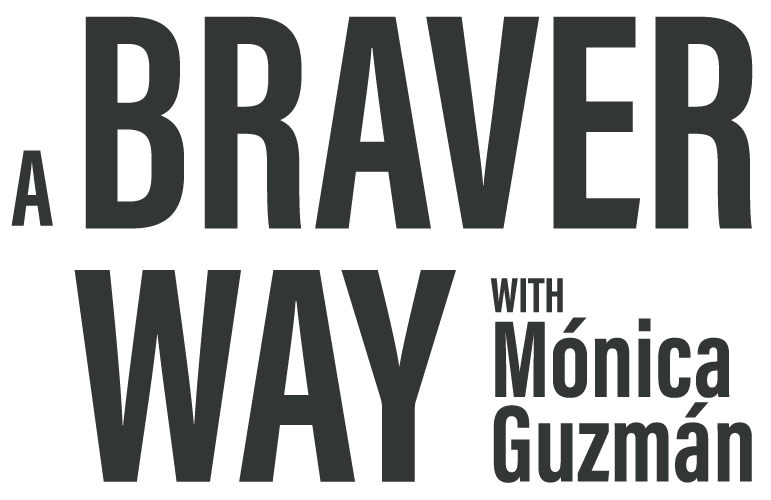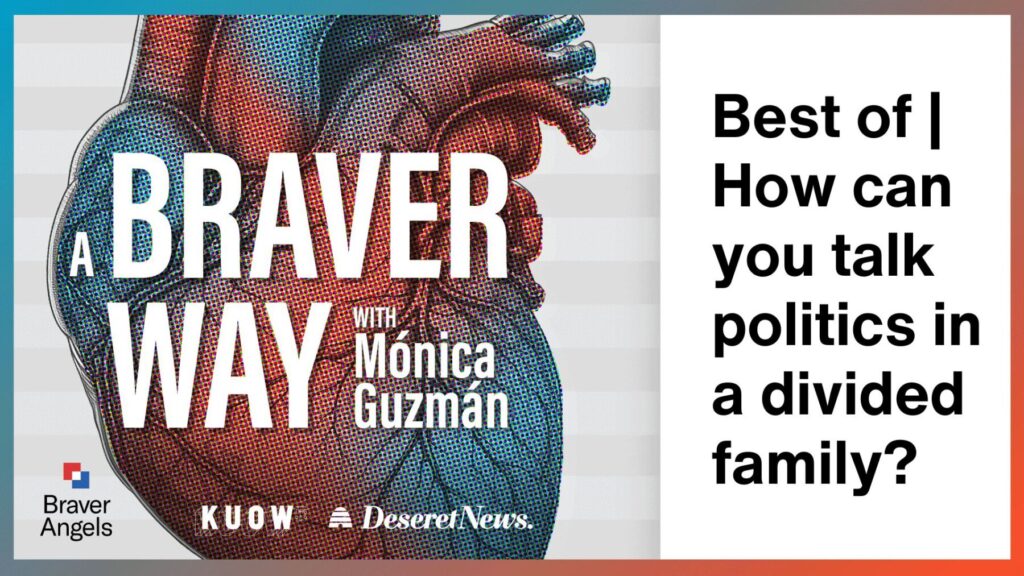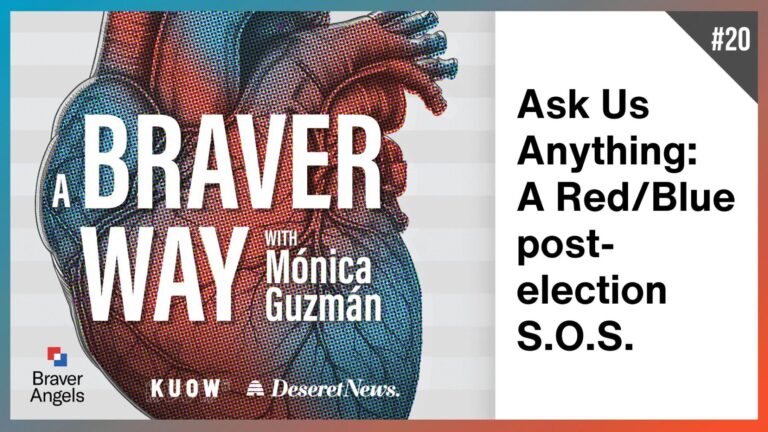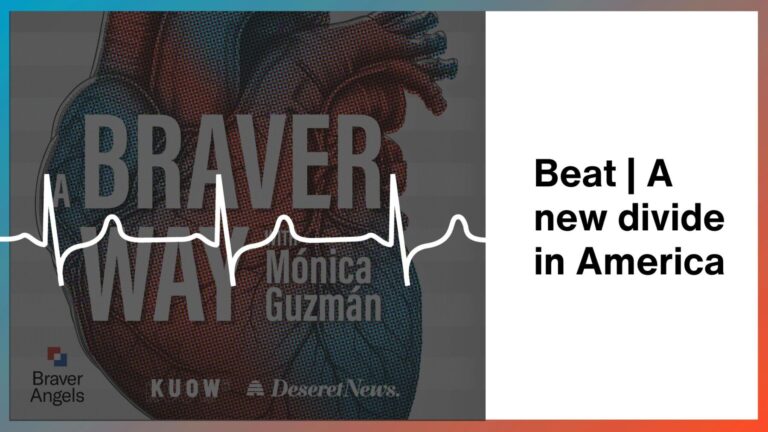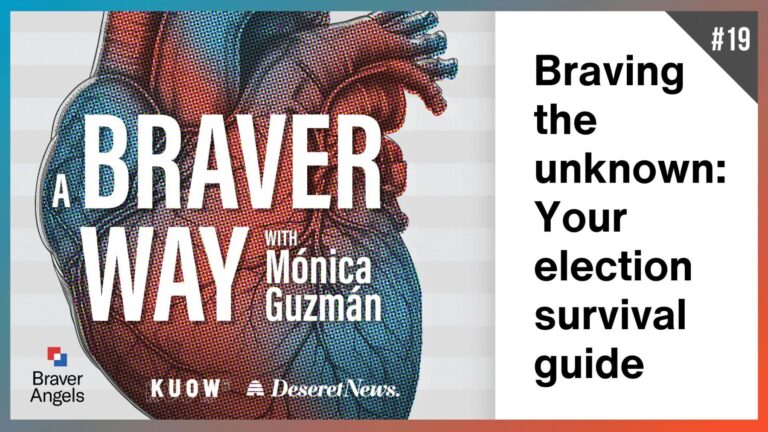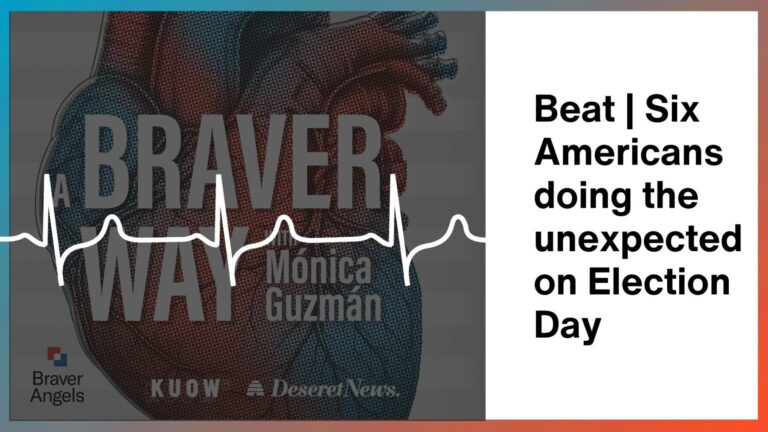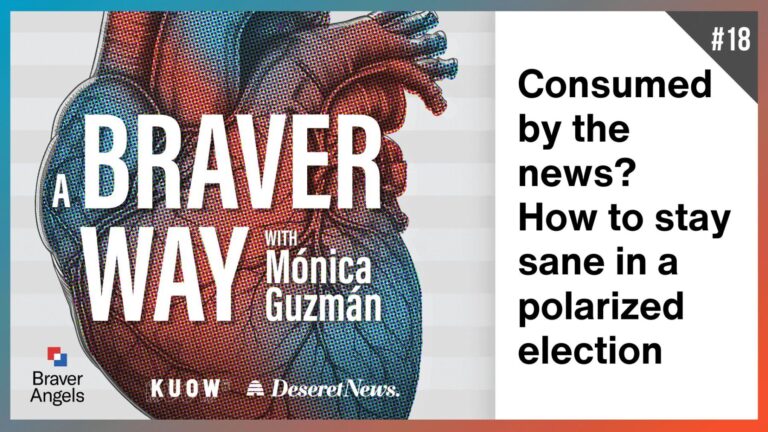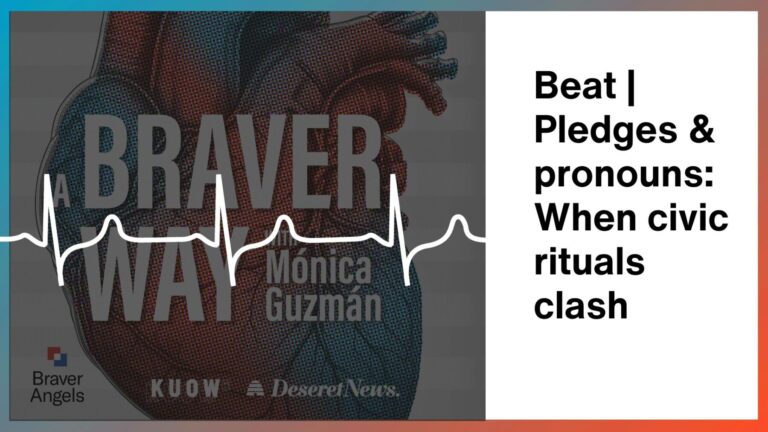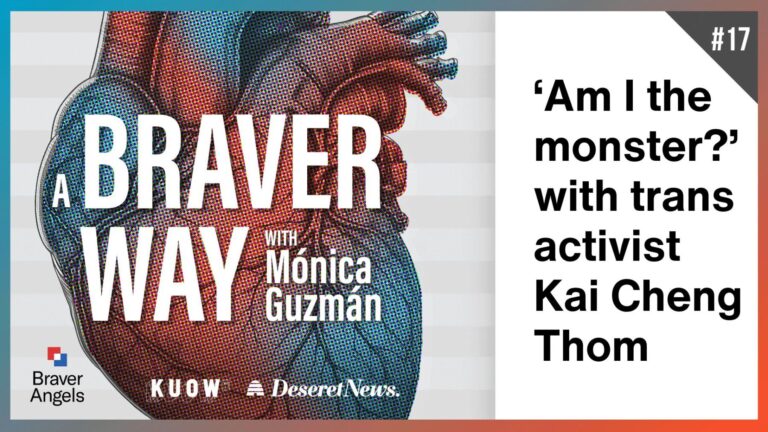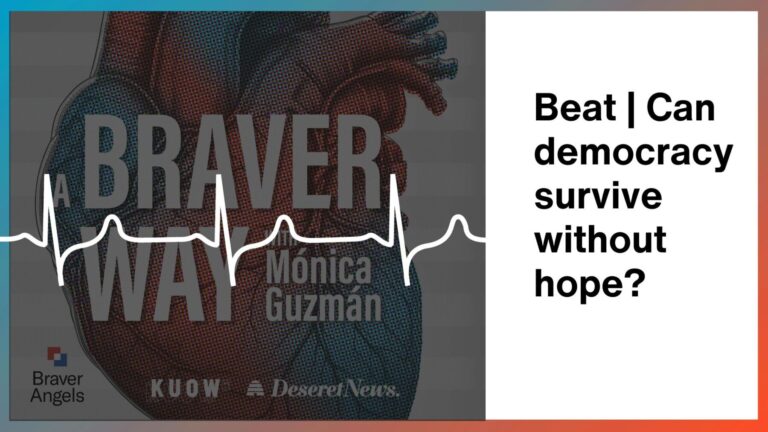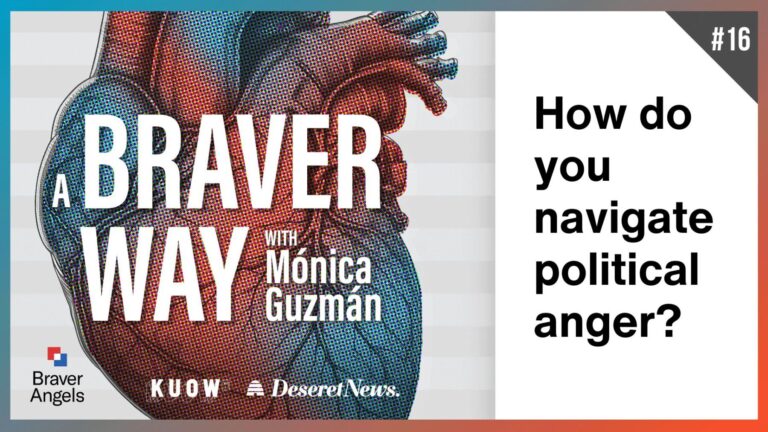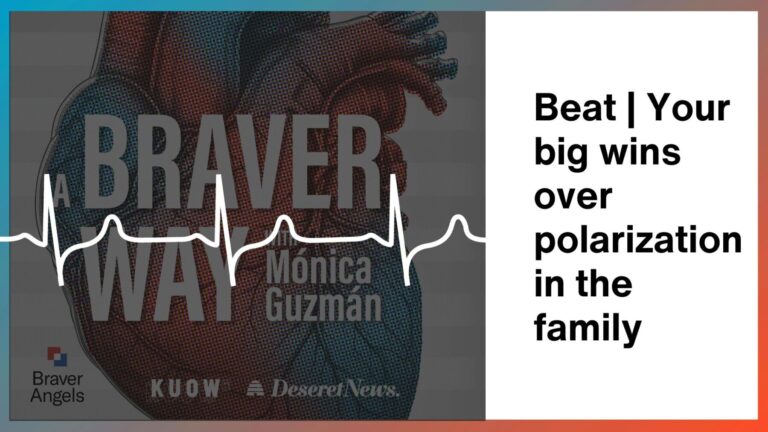This week, we’re going to re-share the most personally vulnerable interview Mónica’s recorded for this podcast. As the election creeps closer and closer, we’re hearing daily from listeners who struggle to talk politics with family on the other side. In this special episode first aired in season 1, Mónica — a liberal — joins the two people she’s argued with most — her conservative parents — for a candid conversation about one family’s struggles with a political divide that cut right through their own home. Looking back on the biggest disagreements that tested their relationships, like Moni’s pro-choice stance on abortion and her parents’ votes for Donald Trump, they open up about the strategies that keep them talking.
Host: Mónica Guzmán
Senior Producer & Editor: David Albright
Producer: Jessica Jones
Contributor: April Lawson
Artist in Residence: Gangstagrass
Cover Art & Graphics: Katelin Annes
Show notes: Ben Caron and Don Goldberg
Featured Song: “I Never Thought of it That Way” by Bernardo Guzmán, featuring Mónica Guzmán (featured starting at 1:29 – Why Are We Here? Braver Angels Convention Plenary )
A production of Braver Angels
Financial Supporters: M.J. Murdock Charitable Trust and Reclaim Curiosity
Sponsors: USAFacts
Media Partners: KUOW and Deseret News
Submit a question: If you’ve found yourself mulling on a concern or reflection as you’ve listened, turn it into a question and share it with us in a quick email to abraverway@braverangels.org.
Subscribe: If you like what you’ve heard, hit subscribe, and leave us a 5 star review!
Share this episode: https://braverangels.org/a-braver-way-replay-divided-family
Follow us: Instagram | X/ twitter | TikTok | Youtube
Join our text line: Text “brave” to 206-926-9955 to join
Join Braver Angels: Become a Braver Angels member
All of our supporting partners are members of Braver Network.
BridgeUSA is a multi-partisan student movement that champions viewpoint diversity, responsible discourse, and a solution-oriented political culture. We are developing a generation of leaders that value empathy and constructive engagement.
GroundNews is a platform that makes it easy to compare news sources, read between the lines of media bias and break free from algorithms.Our vision is positive coexistence where cooperative, civil debate is the norm, media is accountable, and critical thought is the baseline of our information consumption.
Introduction- Host Mónica Guzmán introduces the episode’s theme: How can you talk politics in a divided family? She is joined by her father Bernardo, and mother Lupita.
Mónica shares how 2016 shaped her awareness of political contempt in her social circle and its personal impact on her, as her parents supported Trump.
- Mónica: “Whether it’s among a group of liberals or a group of conservatives or libertarians or anyone, we’re not attacking the other side. We’re attacking our collective ability to relate, build, verify, solve, anything. We’re attacking ourselves.”
Mónica and her parents share their story, triumphs and challenges as immigrants and a child of immigrants in the U.S.
The three discuss their answer to the question: “what life experiences have influenced your values and beliefs about public policy and the public good and sent you toward your political side?”
- Mónica: “It’s a question I talk about a lot, a version of asking how people came to their beliefs, rather than why they believe them. Asking why runs into several snags across a big divide. One, it puts people on the defensive. They want to justify themselves to you instead of candidly exploring their views. Two, it can lead to a showdown of reasons, my reasons versus your reasons, that keep us from listening well to what’s really there. And three, a lot of times we don’t even know our reasons. Our views are the products of so many things. What we’ve lived, what we’ve learned consciously and unconsciously about the world and what we value. Seeing that and relating to it by hearing about moments from people’s paths to their own views makes it a lot easier to get to understanding.”
- Lupita: “Being pro-life and all these things, there’s no other position for me, but being a Republican.”
Bernardo discusses his alignment with Republican values such as self-reliance and economic freedom, contrasting it with his experiences growing up in Mexico.
Supporting Partner: BridgeUSA
Mónica and her parents explore their toughest debates: Trump and abortion, highlighting how deeply personal these issues are.
- Bernardo: “The reason I always wanted Trump to be president is because of completely different reasons than personality. It was because he was a businessman and he had its own resources and he didn’t have to let somebody buy his favors.”
Lupita and Mónica share how their views on abortion differ, and how difficult it is for Lupita to accept Mónica’s pro-choice stance.
- Lupita: “For me, no, you’re killing a human being. Because what you have in your uterus is not a refrigerator or a frog. It’s a human being. So for me, I cannot give an inch on that.”
Mónica’s family discuss the history in their family of having difficult conversations about politics.
- Bernardo: “I always felt like I was a little afraid that those disagreements could break our relationship. So I probably tried not to be too adamant about trying to make my point.”
- Lupita: “For me to say, okay, I’m not going to try to convince her anymore. That was a huge step for me.”
Mónica asks when her parents have felt attacked in the past.
- Bernardo: “I had a situation at work with everybody else I worked with was completely against Trump. And they were saying things that if they knew, they didn’t know that I planned to vote for Trump, but if they knew, they would probably kick me out or something. And so I felt under attack there and sometimes at home when we had those discussions. Because, for example, if you don’t support Hillary Clinton, that means you’re racist. There was a lot of that going on.”
Mónica and her family discuss strategies for having difficult conversations, including taking breaks.
- Lupita: “Now we just try to expose our points of view, hear what the other side has to say, and maybe sleep on it for a while, and come back later with maybe a different approach. And I’m going to go one step further. Not only did we stop trying to convince view to come to our to our view but I personally went from trying to make you understand my position to, ‘these are the reasons why i think this way and i just want you to understand it’ and you did and that was that’s amazing. So, that’s one thing, also, like your dad said, taking breaks is important because sometimes you get to an impasse. You get to a point where, you know what, it’s too heated. Let’s take a break. One time in the middle of a discussion.”
- Lupita: “Validation is important. And also, when we come to a place where we don’t agree on something, we do research together. We go in and Google it together. We search for the answer and then we see, oh, there you go. And usually, we’re both a little bit right and a little bit wrong.”
Bernardo and Lupita explain how talking to Mónica has opened his eyes to the complexity of issues and viewpoints.
- Bernardo: “One thing I’ve learned is that there are way more angles to every issue than I realize. Like, sometimes I simplify things too much and say, well, for this particular issue, there’s, you know, their side and my side or whatever.”
Lupita admits Mónica’s perspective shifted her view on Trump’s character.
- Lupita: “I kept saying, you know, my talking point that, well, you know, I don’t care what he says, just what he does and this and that. And then you said, but mom, he’s a terrible role model for your grandkids and go, oh, that he is. He is because what he says and, you know, he just doesn’t have a filter in his mouth. And I think he should, you know, write something and then read it and then ponder about it and then publish it. But that’s not what he does. That’s what everybody else does. But I’d say, wow. So that made me really think about it.”
Mónica and her parents encourage listeners to keep their hearts open, even in families where political divides seem irreconcilable.
- Mónica: “I have met a lot of people who really thought the doors were closed forever. And you kind of never know. Like there might be cracks in those doors. There might be just a little bit of light. And I think that oftentimes the way to make those cracks a little bit wider is to do the counterintuitive thing, the thing that you often don’t want to do if you feel that things have been burned too far, which is just to listen, just to listen. That’s it. And it’s really hard because you’ll, you, you may feel really wounded or unseen or unappreciated. And then the counterintuitive thing is that people can’t hear unless they’re heard.”
Bernardo, Lupita and Mónica share what gives them hope.
- Lupita: “Organizations like Braver Angels give me a lot of hope, especially after attending their annual convention, Because people that want to reach to the other side, we feel alone sometimes, you know. You think you’re one in a million. No, you’re not. You know, there’s more and more of us that want to reach to the other side and talk to each other. So organizations like Braver Angels, that gives me plenty of hope.”
Supporting Partner: Ground News
Mónica summarizes the episode.
Consider becoming a Braver Angels member
Featured Song: “I Never Thought of It That Way” by Bernardo Guzmán, featuring Mónica Guzmán
Episode Credits.
(music up)
Mónica Guzmán:
Hello everyone, and welcome back. I don’t say this often enough, so I’m gonna say it now. Thank you for emailing us, for texting us, for sending in how you’re seeing everything out there, how everything’s playing out, and what questions you have. That is how we at the show get a sense for where you all are as the election creeps closer and closer and what you, what you think you need to keep that divided political chasm from, you know, swallowing you whole.
(music out)
We hear about a lot of sticking points in your lives here, and one theme that it feels like we’re hearing more and more about this season is how frustrating and confusing and sometimes painful it can be to confront the political divide in your own family. So this week, while me and the team go heads down preparing the second half of this season, and we’re really excited about it, we’re gonna re-share what was the most personally vulnerable interview I’ve recorded for this podcast.
And it’s an interview that happens to be in one of our most shared and downloaded and popular episodes ever. One year later, we’re still getting notes about this episode. “This episode brought me to tears”, wrote one listener named Martha. “Braving this discussion helped me immensely”, wrote another, Pamela. “I’m gonna send it to my mom and dad”, said a third, Morgan. I love that one. I wonder what they thought.
We are going to double down on this family theme in next week’s Beat Episode, so if this episode sparks stories or questions about family and politics from you, please do send them in. Just email us at abraverway@braverangels.org or join our text line by texting the word BRAVE to 206 926 9955. We’ll be listening.
And with that, I am going to thank my mom and dad, once again, for their part in this episode. I’m going to take a deep breath because it’s still nerve wracking and leave you to it.
(Theme music up and under)
Welcome to A Braver Way, a show about how you, yes, you, can disagree about politics without losing heart. I’m Mónica Guzmán. Your guide across the divide to help you hear and be heard by people who confound you. We don’t want to be at war in our country. We want to be at home. So strap in. Because it’s time we learn how to turn up the heat, turn down the fear, and get real about things that matter with more of our fellow Americans than we thought possible.
(Music up and under)
Hello everyone and welcome to our third episode of of A Braver Way. This one’s gonna be different, and a lot more personal. It’s got a conversation that at one point I thought could never happen. Not because my guests today are big hotshots who wouldn’t give me the time of day or anything like that.
Just the opposite, really. It’s because they’re my parents. Hi mom. Hi dad. How’s it going?
Hola, hi! Qué tal? Bien! Qué Bien. (Mónica and her parents exchange quick greetings)
Mónica:
Before we get to that conversation, which I’m excited and a bit nervous to share with all of you. I need to take a few minutes to tell you how it even came to this. Why letting you in on a pretty intimate set of relationships, stories, and struggles. feels important to what we’re all trying to do on this podcast.
(music change. Up and under)
Some of you might already be familiar with my work in bridging divides, political depolarization. There’s lots of names for this. I wrote a book about it called I Never Thought of It That Way. I joined Braver Angels, the largest cross partisan grassroots organization working on it. I travel the country, visiting schools, churches, companies, and all along I’m basically doing two things: gathering the tools we need to cross big divides in our lives. And trying to put those tools in easier reach. But no matter where I am in all of this, at one moment or another, I think of my parents. These two awesome people who brought me into this world. Who brought me into this country, for that matter, and see it all so differently. I’m a liberal. I voted for Joe Biden and Hillary Clinton in the last two presidential elections. My parents are conservative. They voted both times for Donald Trump. When people ask me why I do what I do, I’m instantly transported back to 2016, after that election, in Seattle.
That’s where I live, a city I absolutely love. I was working in daily journalism, keeping a pulse on everything in the city, and I started noticing something that was happening to me when I went to get- togethers and people would start talking about the people who voted for Trump.
(music change and under)
Just about everyone I knew was liberal and scared for the country, like I was. What I noticed started in my gut. People would say that Trump voters were basically monsters. They wouldn’t put it that way, most of the time. It would be subtle and quick, and sometimes not even that conscious. A joke about how ignorant they are, a side comment just presuming that they’re beyond immoral and uncaring.
Sometimes it was a jab out of seemingly nowhere, but it would build up in the group, it would echo around the room. And in my gut, I felt attacked. Me, a liberal who was right there with them on the worry, the frustration, right there with them on the need to vent and bond, and yes, rage sometimes, about the madness I was scared a Trump presidency would bring.
But when I picked up this sneaky contempt about Trump voters, that’s when I felt it. I started off ashamed of this gut sense of being attacked. I tried to ignore it. I mean, no one’s saying it about me, but people opposed to me. Isn’t that, I don’t know, good? And if it bothers me that people are saying that, isn’t, I mean, does that make me bad?
But eventually I realized what was going on. When people said horrible things about Trump voters, they were saying horrible things about my parents. People who are good and smart and mean the world to me.
(music change and under)
I knew what they were saying, what we were saying, frankly, ‘cause I saw myself nodding and laughing along. I’m not gonna pretend I didn’t. I knew it was wrong, but I also began to sense something I didn’t clarify till much later. That saying these false, contemptuous things about people we barely knew, believing those things, sharing them, building a group identity around them, even if it’s because we want to protect the world from harm, is profoundly harmful itself.
I know now that in those conversations then, and in those conversations today, whether it’s among a group of liberals, or a group of conservatives, or libertarians or anyone, we’re not attacking the other side. We’re attacking our collective ability to relate, build, verify, solve, anything. We’re attacking ourselves.
Sensing this was part of what sent me down this path. And then I started working on my book and hearing from so many people in so many families who were struggling under the weight of their political differences. And I realized that sharing my family’s story and struggles could offer a case study, an example of how these things can strain relationships and how certain tools can help.
(Music out. Music change, up and under)
Mom and Dad were still a little hesitant to talk publicly about it all, though, which I totally get. My dad in particular, tends to keep his opinions fairly close.
Bernardo Guzmán:
Initially, I was a little nervous about getting to see some rejection from somebody about the way I feel or I think about politics.
Mónica:
Yep.
Bernardo:
But after I saw what Braver Angels is doing, I, I thought it was a good idea to participate.
Mónica:
As for my mom She’s never been that shy about anything. And when we started talking about the idea of recording a conversation together, I realized I probably got my general craving for candor from her.
Lupita Guzmán :
Whenever we talk about, people disagreeing within the family, the famous Thanksgiving dinner talks, and then people say, no, we just don’t talk about politics. We just don’t talk about religion. We just don’t talk about this or that. And I don’t. And that, I go, “no!, but you’re missing a chance!”, to learn from each other, to see how the other side thinks, because we, we don’t have the full view of things. We never do. So that’s, that’s my motivator.
Mónica:
The accents you’re hearing, by the way, are Mexican accents.
I was born just outside the big city of Monterrey, Nuevo León, Mexico. My family came to the States when I was five and my little brother was two. We moved to Texas, then New England, when the company that my nerdy dad did IT for in Mexico found a job for him in their factory in Dallas.
Bernardo:
I spent almost 30 years of my life in Mexico. I grew up there. And all through that time, I was always admiring the, the United States as a country. As soon as I, there were indications that there was going to be an opportunity for us to move into the U. S., I decided, wow, we, I’m going to be able to give my family the opportunity to live the American dream.
Mónica:
So, my parents packed up our Chevrolet Citation, said goodbye to all our aunts, uncles, my four Abuelitos, my amazing cousins, I remember crying a lot that night, and started a whole new life.
Lupita:
I’ve always been very close to my family, to my mom and my sisters, and just to move away. And we’re, I’m the only one who’s away.
It’s not like, okay, everybody wants to go to the U. S. No, you know, nobody did. So, so, and you guys were little, five and two, and, and of course we had no friends. So, so it was tough.
Mónica:
I remember Mom, when you would cry because. You didn’t get to talk that long to your family in Mexico
Lupita:
Oh, yeah
Mónica:
..because long distance charges were really high at the time.
Bernardo:
Yeah
Lupita:
Long distance was very expensive. And I remember your dad said 10 minutes and that’s it. But 10 minutes?” With 10 minutes you just talk about the weather, you know?
Mónica:
Yeah.
Lupita:
So, so I would just grab the phone and start running. And I’d run. Oh yeah.
Bernardo:
I would chase her all over the house.
Mónica:
Wait, seriously? Dad, really?
Lupita:
And your dad would chase.
Mónica:
What!?
Bernardo:
I had to chase her. To hang up.
Lupita:
No, no! And sometimes I would just lock myself in the bathroom because I wanted to say more things to my mom!
Mónica:
Oh, I didn’t know that!
Lupita:
And we were very close. I mean, I’d cry over her shoulder, you know, because we’re alone in this country and with babies, it’s hard. But we don’t regret it, not even for one second.
So it was a good move.
(music up and under)
Mónica:
Being an immigrant has always been a tricky thing to try to explain. And there is so much I didn’t know about how my parents got through those early years. At one point in our conversation, Mom brought up how Dad just gave up on ordering fast food at the drive thru window. He understood a fair bit of English, technically, but the drive thru speaker made the cashier’s voice come through weird, and he just got fed up with not being able to understand them.
Which leads to a fun fact about Dad. Drive thru speakers have gotten a lot better since 1988, and so has his English, but he still refuses to go through drive thru lines at fast food joints and will just park, and get out, and order, and Mom is still kind of ticked off about it. As for me, being in a whole new world made me more shy and more careful.
After I heard the drive thru story, I remembered a moment from my first-grade classroom in the small town of Dover, New Hampshire. I raised my hand. I remember my heart was pounding to ask my teacher for extra paper I needed for an assignment. She said it was in the drawer and pointed to the front of the room.
But I didn’t know what a drawer was yet. And I thought what she said kinda sounded like door? So I walked up to a cabinet near where she pointed, and I squeaked, “This one?”.
(music out)
Mónica:
My teacher stormed out of her desk, marched over, pulled my arm toward the right place, and said, Drawer! Drawer! I was mortified. Then a boy in my class laughed.
And I think that made my teacher realize she had gone too far. She told the boy it wasn’t funny, and that he had to do whatever I asked him to do. Then she turned to me, softened her voice, and asked me to tell him to do something, but to tell him in Spanish. I don’t remember what I told him to do, but I do remember him not doing it, and me smiling.
(music under)
The lesson for everyone was clear. We all want to hear and be heard, understand and be understood. It’s not fair to resent each other when we don’t have the tools we need to do it. So to start off the conversation, We each took turns answering the question, What life experiences have influenced your values and beliefs about public policy and the public good, and sent you toward your political side?
It’s a question I talk about a lot. A version of asking how people came to their beliefs, rather than why they believe them. Asking why runs into several snags across a big divide. One, it puts people on the defensive. They want to justify themselves to you instead of candidly exploring their views. Two, it can lead to a showdown of reasons. My reasons versus your reasons that keep us from listening well to what’s really there. And three, a lot of times we don’t even know our reasons. Our views are the products of so many things. What we’ve lived, what we’ve learned, consciously and unconsciously about the world, and what we value. Seeing that, and relating to it, by hearing about moments from people’s paths to their own views, makes it a lot easier to get to understanding.
Here’s Mom’s answer, then Dad’s.
Lupita:
We had a, officially a two party system, but in reality it was a one party system. The president would select literally among his friends or, or the people who did him favors, right? Who the next president of Mexico was going to be. We all voted, but the other party never won because they did everything they could illegal. Right. So that they could reelect themselves all the time. So coming from that, you know, your dad and I were, we’re sick of that. We’re tired of that. We like how in the U S you vote and your vote counts. Right. When we moved to the, to the US a few years in, I started volunteering because I’ve always been pro life. But in Mexico, it wasn’t even an issue because everybody in those years was pro life. It didn’t, it didn’t even come up. Every, everybody was in the same boat. Now it’s changed. So when, when I came to the US I realized, Oh, not everybody. is of the same mind. So, so being pro-life and all these things, there’s no other, no other position for me, but being a Republican. So there’s, until anything changes, that’s how I’m going to vote.
Bernardo:
Yeah. So once we moved to the US I, I started, seeing things, things that like the rule of law, which is something that I’ve always supported, but it was a little frustrating when I was still in Mexico because it looked like it wasn’t being respected as it should.
And, I realized that in the US that is way more respected. So that, that to me was very important, a very important value. And I, I started seeing the, the difference between the, the two, uh sides, and it looked to me like the, the Republican side or the conservative side was more in tune with what I was looking for, including self-reliance, economic freedom, not overtaxing the population, you know, trying to get the government out of the way of people’s attempts to do better. And I started lining up with the Republicans on that side, and that’s why I’m, I’m a conservative.
Mónica:
As for me, I brought up a time I went to visit our extended family in Mexico in 2004, while I was in college. My Abuelita, my grandmother, read the newspaper every morning and mentioned a presidential candidate who’d recently been assassinated.
But like, casually. Like, it just happens. So I asked her a bunch of questions. And there I was, the college age gringa granddaughter, incredulous, not so much that these are the headlines in my native country that I love, but that the people in it just accept it. That there isn’t more outrage, more action, more hope.
I told my parents about some other moments that came up, as I thought about the question with them, too.
I remember, in high school, in my ethics class, this wonderful teacher who I absolutely love, was teaching us all these nuances about ethics. And there was a class that included a documentary about abortion. I think it was called “If These Walls Could Talk”. And up until then, I was kind of ambivalent in some ways about abortion. The documentary was surfacing all these different people’s stories, who had chosen to have abortions. And I remember after seeing that, I thought, I’m pro-choice. I’m pro-choice. I want to give people the space to make these decisions.
So, I remember that really clearly. I don’t remember if you, this is another one that has to do with you, Mom, when I was little, and the first Iraq war started, I don’t remember where we were, I think it might have been in Mexico, or like a Chuck E. Cheese, I don’t know, but,
Lupita:
Mexico or Chuck E. Cheese?
Mónica:
I know! I don’t know why those two things, I don’t know, it makes no sense. But what I, what I do remember is that I was, I was little, and I was with you, and you started crying, and I said, “Mom, what’s wrong?”, and you said, “There’s a war that starts today, a war is starting today.” And I asked you a little bit about it. And you, you basically were saying things like, no matter whose side you root for, when people are hurting each other, it’s just always bad. And that’s, that’s sort of stuck with me as an early moment where I really thought about, you know, harm, the harm that people can come to. So that puts me more on the liberal side in a lot of ways. I think all of, all of these things I just listed, and these are just a few moments. Every time I think about this question, different things come up, but that’s what came up when I was thinking about it now.
(music up)
Mónica:
Okay. Before we get to the interview, I want to tell you about one of our supporting partners. Imagine a place where civil discourse reigns, where diverse perspectives come together. and where solutions are born. That is BridgeUSA. BridgeUSA is a youth led, multi partisan organization fighting for better political dialogue on college campuses.
Yes, college campuses. All across the country. Since 2016, they’ve engaged thousands of high school and college students in constructive political discussions aimed at better understanding and finding solutions for the future. I’ve spoken at their summit, I have seen them in action, conservative students, liberal students, all kinds of students, speaking up and learning from each other, and I’ve got to tell you, I have been nothing short of blown away.
If this is how young people talk about politics, we might be alright after all. Learn more about BridgeUSA and find out how you can get involved at bridgeusa.org. Thank you to BridgeUSA for being a supporting partner of A Braver Way.
(music out)
Mónica:
Now I’m going to drop you straight in to our conversation about how we disagree about politics in my family. We’ll start with something totally uncontroversial. Just kidding.
Okay. What have been our biggest political disagreements? What do you think are the topics where there’s just the most fire?
Bernardo:
I say presidential elections.
Mónica:
Yup. Yup.
Bernardo:
Number one.
Mónica:
We should just say the name Trump. Say the name Biden. Say the name, please. This has been rough. Yep. Okay.
Lupita:
Elaborate, Papi. Elaborate.
Bernardo:
Well, that, that’s when, when things got more
Mónica:
heated.
Bernardo:
Exciting.
Mónica:
Exciting is one way to put it.
Bernardo:
Because we, we had different, different ideas of who should be president, for every election. I remember, obviously Trump has a personality that a lot of people don’t like, but the reason I always wanted Trump to be president is because of completely different reasons than personality. It was because he was a businessman, and he had his own resources and he didn’t have to let somebody buy his favors.
So to me that that could be a different kind of president for the country because presidents in the past had always been leaning towards, what the lobbyists would do, would try them to do, or, take a lot of money for their campaigns from this and that, and that, I thought that could, could be different, with Trump.
Mónica:
Yeah, I gotta, tell the listeners, even as you say that, I can feel, I can feel my pulse kind of come up, I really, every time it’s just, ah, so in case anybody thinks this is easy for us. It’s not easy, you guys. It’s really, really not. And my dad and I have had lots of disagreements about Trump. So yeah, even now I can sense the like fire come up in me. And then, I’ll name abortion. I think that when I talk about being pro-choice, Mom, I think that that is hard for you to hear.
Lupita:
Yeah. Yeah. Especially because I knew, and I know now so much about abortion and the specifics on how it’s done. ’cause people, they just hear, okay, you just terminate your pregnancy. And for me it’s, no, you’re killing a human being. ‘Cause what you have in your uterus is not a refrigerator or a frog, it’s a human being.
So for me, I cannot give an inch on that. I can come to terms with anything else and see the logic of many things, which, you and I have had many conversations, but I can, in particular, think about one time when we were going to our timeshare. We had a timeshare in North Conway when timeshares were cool. Now it’s all Airbnb, right? we were, it was what, a two, three-hour trip in the car. And the subject came up so we started talking about that I always suspected that you, Mónica was, that you were pro-choice, but then at that specific time you told me your position and I it really, it broke my heart.
That was very hard for me ’cause I couldn’t fathom it. I was thinking she’s gonna have her own kids. How can she think that it’s okay to kill ‘em, before they even have a chance for life.
So that, that was hard on me. And I cried, it just hit me later when I was alone. And then it took a couple of days to not get over it. ’cause you don’t get over that. But to just get used to it, and be content with the situation. ’cause I’m not, I’m not gonna change it. That’s your position. And that’s another thing that, then, I was still trying to convince you.
Mónica:
You were bringing up that we, you tried to convince me, I remember about abortion, and I tried to convince the both of you not to vote for a certain presidential candidate. That didn’t work!
Lupita:
Nope
Mónica:
And I think we, we learned fairly quickly. I, I don’t know, it just feels like it’s just not going to work.
And so, and so eventually, I, yeah, you were trying to find the word, Mom, like, content? Is it that you’re, you’re never okay? You’re never okay with it? But..
Lupita:
I’m no, I’m not okay with it. No, I’m not. Okay. It’s, I still have a little worm, I still have the little Jiminy Cricket, that’s telling me, oh, but that’s wrong. But you should be doing more about it.
Mónica :
Yeah. Same. Dad. Dad, how do you think about that piece of it? You’ve tried to change my mind about some things too, but how does, I don’t know. Is there something in you that feels, you’re not okay with how I feel about these things?
Bernardo:
I remember thinking when you went to college and you started coming back and, having conversations. I remember thinking well, she’s, she went to this college and apparently in most colleges those days the majority of the faculty is liberal, the overwhelming majority. I was thinking she’s not gonna hear college, any of my side of arguments. She’s only gonna hear the other side. So how far can I go trying to convince her of anything? It might not be possible.
There, there was a time when I thought may maybe she’ll come to her senses as she grows. But that is probably just a myth that it happens. ’cause I remember me being idealistic when I was much younger, like a teenager, and then I started realizing that’s all, that is never gonna happen, so.
Mónica :
Do you think you were more liberal..You would’ve been more liberal if you were younger?
Bernardo:
I might have, I might have been a more liberal when I started thinking, you know? But then eventually I became more practical about the reality of the situation.
Mónica:
We, we named, we named the presidential candidates. We named abortion. And then there’s one that’s hard for me to name, but I think it’s, something around how, a disagreement on how we characterize, like the, the injustices in the United States,
Bernardo:
Mm-hmm
Mónica:
the impact of racism and sexism and those sorts of things in our society is more It’s like, it’s something that for me is, is a bigger thing to solve. We used to have big disagreements about welfare, I think in the nineties and into, so whenever it was some system, that I just thought, it’s not working. And so we need to do other things or we need to strengthen the way that we give people help in a public way, which for me means like the government does it.
Well, so that’s the way I think of it. And so I’ve seen. I’ve seen our disagreements sometimes come around that, and whether it is like, 2020 and racism and things like that. There’s been disagreements about how bad is this problem, and how much sort of radical steps should be taken to address it, that I think we disagree.
But let’s move on to, we already said a couple things, what’s been hard about having big political disagreements in our family? What have been the challenges for you, and the toughest moments?
Bernardo:
I always felt like, I was a little afraid that saying those disagreements could break our relationship. So I, I probably tried not to be too adamant about trying to make my point.
But, like, you might remember that time when I asked you if, we were ever gonna be prevented from seeing our grandkids, because I heard some stories that people were having that situation in their families, and I, yeah, I didn’t want, want any of that to happen, so.
Mónica:
That was the first time I realized that you really were afraid of that, when you said that. It surprised me to hear it like, Oh, he really does worry.
Bernardo:
Yeah.
Lupita:
The hardest thing for me, it was to give up on trying to convince you. Because it, it goes against, I have a very strong sense of doing the right thing. I always worry. And even though I’m a Republican and there is a preconception, I worry about others.
And,
Mónica:
You do… You really do.
Lupita:
…and for me, to say, okay, I’m not going to try to convince her anymore. That was a huge step for me.
Mónica:
For me, one of the hard things, especially in the beginning of the Trump campaign and after he’d won the first election. I live in Seattle. A lot of my friends are liberal, but there were a lot of people who spoke as if you’re a bad person if you have someone who supports Trump in your life and you’re not always trying to change them.
Lupita:
Mm-hmm
Mónica:
And so it’s funny because I never questioned my love for you guys, like never, ever, ever, but I did question if I was a bad person for not trying harder to change you.
Lupita:
Exactly.
Mónica:
I did question that, like a lot. and that was hard. And I also remember there was one moment, we’ve talked about the, seeing this movie called Bowling for Columbine, where it was all four of us in the car.
And you two were in the front seat, and me and my brother were in the back seat, and me and my brother came out from this Michael Moore documentary that, as I look back on it, was pretty anti Republican. But at the time,
Lupita:
Mocking. Mocking Republicans.
Mónica:
yeah..me and my brother saw it as, like, what we saw it doing was making a really compelling case about a bunch of issues we cared deeply about.
But I remember coming out of that going, wow, what a masterwork! And just assuming that the two of you would have seen it exactly the same way I did. And then when we brought up..
Lupita:
Nope.
Mónica:
..when I brought up to you like, wow, wasn’t this great? Like, do you see that? Like how cool that is? And you guys were like, not at all. That was garbage. What are you even talking about?
And, and I, and the rage that I felt that you weren’t seeing something that was so obvious to me. that, that for me, cause you guys know, I, I’m fire. I am, I am kind of fire and the fire comes out when I think you guys aren’t seeing something that is so obvious to me, and that plays out a lot where that’s a hard thing for me. That’s a hard thing.
Lupita:
But that was that, that was when we, when we started noticing that we disagreed so much and we, we really didn’t know how to do these conversations. So we were pushing each other’s buttons and we were triggering each other like there’s no tomorrow.
Mónica:
All day long…
Lupita:
On purpose, on purpose.
Bernardo:
I think that the maybe reason we didn’t see that movie the way you did, is because we may might have taken it personally that it was painting us as a monsters or bad people, really bad people.
Mónica:
That’s a great point.
Bernardo:
Even though we, we never had, we never owned guns, We don’t even like guns, but we support the right people having the right to own guns or whatever. It’s the constitution, right? So, in that movie, I remember it, it felt maybe we shouldn’t even be seeing this movie because we’re being painted on the screen like we were part of those things…
Mónica :
Yeah.
Bernardo:
…that they were complaining about and we’re not,
Mónica:
Yeah.
Bernardo:
…so
Mónica:
It’s funny because I, I see that now I see that now and I don’t know that I was seeing that then at all.
So let me ask this. When have you felt attacked by me? Any…?
Bernardo:
Yeah. There were some parts of the last stretch of the campaign, the Trump campaign, when he was running against Hillary Clinton. I felt like I was, behind enemy lines. For example I had a situation at work with, everybody else I worked with was completely against Trump, and they were saying things that if they knew, they didn’t know that I planned to vote for Trump. But if they knew. They would probably kick me out or something. And so I, I felt under attack there and sometimes at home when we had those discussions, because,
Mónica :
Yeah.
Bernardo:
For example, if you don’t support Hillary Clinton, that means you’re racist. There was a lot of that going on.
There was those things were coming in from everywhere, social media, everywhere, the news,
Mónica :
And so if you felt that from me, it was like a proxy of everybody else.
Bernardo:
Yes. Because you were part of that same mindset.
Mónica :
Part of that whole thing, yeah. And I think the times that I’ve felt attacked by you guys was largely that same dynamic for me, where it felt like you guys were representatives of a side that seems like it’s against me and what I value.
I would show up to your house a bunch of times with I remember Dad the argument we had, Trump had said that he had not said that he would respect the peaceful transfer of power.
Bernardo:
Right
Mónica
Like he was asked that question at a debate
Bernardo:
Yeah.
Mónica:
And he didn’t say he would do it! You know? Aand so I brought that to you okay this for sure you have to say is a problem.
And you you wouldn’t say it was a problem. So it’s not like I felt necessarily attacked by you, but sort of, like you, you defending that felt an attack on everything I feel is good and right. Do you know what I mean?
Bernardo:
Right.
Mónica:
But we had that conversation and it got really complicated and really interesting and I learned a lot from you in it. So I, don’t wanna leave it thinking, leave that that, there, …
Okay, so let’s move to what do we even do in our conversations to be able to talk about this stuff?
Bernardo:
We didn’t do this in the beginning, but we, I think we learned to do it to basically not try to change other’s minds.
Once we realized that that worked, then it would allow the conversations to continue. Now we just try to expose our points of view, hear what the other side has to say, and maybe sleep on it for a while and come back later with maybe a different approach.
Lupita:
And I am gonna go one step further. Not only did we stop trying to convince you come to our view, but I, well, I personally went to, went from that to trying to make you understand my position. These are the reasons why I think this way. And I just want you to understand it. And you did. And that was, that’s amazing.You know?
Mónica :
Yeah.
Lupita:
So also like your dad said, taking breaks is important. ’cause sometimes you get to an impasse, you get to a point where, no, you know what, it’s too heated. Take a break. One time in the middle of a discussion, we watch an episode of what’s the show that we watched together?
I forget.
Bernardo:
X files.
Lupita:
X-files. And then came back to the discussion, and.
Mónica:
Pause. We need to go see Mulder and Scully
Lupita:
And that helps.
That helps because then you calm down, your heart rate slows down. then, you see it in a different way. Also, it’s important to validate the other person’s point of view, because their position, in their view, if you were in their shoes, That’s the logical way of thinking, and it’s hard for people. It’s hard for us, for everybody to put ourselves in the other person’s shoes. So validation is important.
And also we, when we come to a place where we don’t agree on something, we do research together. We go in and Google it together. We search for the answer, and then we see, oh, there you go, you know.
We’re…and usually we’re both a little bit right and a little bit wrong, you know?
Mónica:
Yeah, that’s happened a couple of times. I remember. Yeah. In particular was that time at your house. You and I were having a thing about kids in cages, that policy…
Lupita:
Right.
Mónica:
And you were saying, this started with Obama. And I was like, no, it didn’t. Or like it couldn’t have really. And then we looked it up and parts of it did start during the Obama administration, you know not everything, but parts of it did. And I guess we just had, there’s a lot of things I think we do to get to the point where we can learn together, and it takes some trust.
What I was gonna say too, that I think we do really well is, and I don’t always do it that well, I should say, this is not like a perfect zen practice at all. But listening for a long time. When we’re able to really listen for a long time. So that time that I called you Mom in 2016, the night of the election when Trump had won
Lupita:
Oh yeah.
Mónica:
And you were really happy, but you did not let it show. Because you wanted to hear me and how brutally sad, and disappointed and scared I was.
Lupita:
You were, y sounded so hopeless. You thought the world was gonna end the following day.
Mónica:
I did.
Mónica :
And I still worry about the world, to be honest with you. It wasn’t, we survived the last few years, but I worry about some deep things and some of the deep, some of the things I worried about that night I’m still worried about. But you listened to me and you didn’t gloat. You could have gloated.
Lupita:
Well…
Mónica:
And I think back to that because then I called you, ’cause I ended up writing about that scene in the book and I didn’t even realize how happy you were because I didn’t ask you. Did. I? I didn’t. I was only thinking about myself, And you heard me out!
Which dad, I think with you, feel like you and I have more of a banter that goes faster. We’re like, no, no no! Bleh, bleh, bleh!”
Bernardo:
Yeah.
Mónica:
Yeah, maybe. So, maybe the listening isn’t always as strong
Bernardo:
The other thing I think helps us is that we have other things that we can do together besides talking about politics.
Mónica :
Yeah.
Bernardo:
Like music or going to movies or cooking together, or just looking at old photos.
Mónica:
Yeah.
Lupita:
And that helps ’cause in particular, ’cause you know how, and you were talking about this, my husband, your dad, has the amazing capacity, capability of, if we’re talking about something, an event in the past or whatever, three seconds they say, oh yeah, look.
What?
Mónica:
He has the photo.
Lupita:
How did that happen?
Mónica:
From 15 years ago.
Lupita:
And that particular event. So he has it all in folders and it’s all in the cloud,
Mónica :
Yeah.
Lupita:
wherever that is.
Mónica:
And he can find it on his phone at any moment!
Lupita:
Yeah! And that helps because you are having a heated discussion. And then we talk about when we’re little, I say, oh, here you go. And everybody goes, “oh!”. So it’s a constant reminder that, hey, no matter what, we love each other. Look, we’ve been through all this together and we love each other. We’re there for each other no matter what. And I’ve told you guys,
Mónica:
yeah.
Lupita:
…whatever you do, my love is always gonna be there for you. I don’t care what you do. I might not agree with what you do. You might be a murderer, but I’m not gonna stop loving you, you know, even though I don’t agree with what you do. And you know this,
Mónica:
yeah.
And then one other thing I wanna list too is, you were saying, validating each other’s perspective, but just acknowledging good points when we make good points, even though we’re not gonna agree on the whole thing. I think we’ve gotten pretty good at that. Instead of just saying, “no, that doesn’t make sense!”, as a reaction, as the default reaction. Like, nothing in this other person makes sense because my job is to stand for what I believe and I will never give an inch. And actually I think that over time I’ve seen us do that where we say, oh, that’s a good point. Saying that’s a good point, doesn’t mean that I’m suddenly weak
Lupita:
Exactly. Right.
Mónica :
Or that I’m gonna give ground to you the overall thing. Also because again, it’s not really about winning and losing anyway. So, over time, I think it’s what you said, Dad, we stopped trying to change each other so much, and then it’s not really about winning and losing. And so somebody made a good point, what it does is it encourages us to dig deeper.
Okay. I think we’ve got a good bit of things there. So let’s get to this. And this is something that I hear from people all the time who know about our story and that we continue to talk about politics even when it’s hard. And they’ll go, yeah, but “do you actually learn anything? Do you actually show each other things about the issues?”
Because they hear us say that we’re not trying to change each other’s minds, which we’re not. And I haven’t changed my mind on anything major, and I don’t think you guys have either. So let’s talk about what is something you have learned about the issues as a result of talking, you know, to your daughter?
Bernardo:
One thing I’ve learned is that there are way more angles to every issue than I realized. Like sometimes I simplify things too much and say for this particular issue there’s, there’s their side and my side or whatever. But there’s more, there’s always more. There are so many groups of people that have totally different life experiences and situations that for each one it might mean something totally different. So I’ve learned to account for more than one or two or three points of view about a particular issue.
Lupita:
So I, so my issues…
Mónica :
Or the thing you’ve learned about an issue or issues because of conversations with me
Lupita:
Yes. Yes. so we were having, again, a discussion about Trump and his character. And I kept saying, my talking point that I don’t care what he says, just what he does, and this and that.
And then you said, but mom, he’s a terrible role model for your grandkids. And go, oh! That he is! He is, because what he says and, he just doesn’t have a filter in his mouth. And I think he should, you know, write something and then read it and then ponder about it, and then publish it.
Mónica:
That’d be nice
Lupita:
But that’s not what he does. That’s what everybody else does. But I’d say, wow. So that made me really think about it And the other was pretty recent. When Roe versus Wade was uh, what’s the word I’m looking for? Was…
Mónica :
Overturned.
Lupita:
Overturned. We were having that discussion and say Mónica, because again, the world is gonna be over for you. You were crying. You were literally crying. I say, Mónica ‘s just gonna go to the states and say, no, mom, but that’s not it. He said, this could be taken as a precedent to continue and maybe gay marriage is gonna be abolished,
And then that’s when we went and did research together. And we saw it and I said, oh my gosh. That’s true. And it’s a completely valid point, and you are right. Hopefully it won’t happen. ’cause I believe anybody should get married if they wish to get married. Why not? How does that affect me? But anyways, those are the two.
Mónica:
those are, yeah. Wow.
Lupita:
…The two moments that, again, I’m not gonna turn into a Democrat or liberal, but that made me think that, well yeah, she’s right in this, with this issue.
Mónica :
So I have one for each of you. With Dad, our conversations about Trump have taught me so much, I remember there was a time when you told me do you remember the character House? From that TV show. So House is this wonderful TV show about this doctor
Lupita:
Hugh Laurie
Mónica:
Yeah. Played by Hugh Laurie, Total jerk. Just a terrible behaving person in every way. And he’s a genius and he works at this hospital and he does not respect anyone else in leadership and he treats them like crap, but he’s always working out the puzzle of how to help the patient with the mysterious ailment. And he’ll, that’s what he’s out to do. But he’s a broken, like something about him as a person is fairly broken. But he’s focused on these things. And so when you told me that to you, Trump was kind of like that.
Bernardo:
Yeah.
Mónica :
Just not, not a respectful person. Maybe maybe these things he doesn’t do very well, he’s really working to try to save that patient. And I was really trying to see things from point of view and that, um, that illuminated something for me. And so did that conversation I brought up earlier where I said, Trump is not, Trump is saying that he wouldn’t honor the peaceful transfer of power. Like how can that possibly… We ended up having a conversation about being a winner or the strength and you basically, you pointed out that one of the reasons you love Trump and you really respect Trump is that he’s such a winner, that he doesn’t even entertain the possibility of defeat. And I remember you put it to me that way and for that moment I was like, oh, that adds up to me. Like I get that. I get how that would come off as being like a really strong winner. Somebody who doesn’t even entertain the possibility of defeat. I’m extremely worried about the consequences of that in our democracy. Like, not okay with that at all. we’re laughing here, but this is actually like a real worry. But I knew what you meant, and that really, it, again, it illuminated something for me.
And then Mom, I was in summer of 2020. Obviously everyone was having a lot of conversations that were really tough around race and racism and justice and everything. Black Lives Matter was everywhere. And I remember, you. you didn’t support Black Lives Matter, the organization, you would tell me, I support the movement. I don’t support the organization. And I was like, what’s the difference? What do you mean? Like, why would you not support the organization? They’re working for something really important. And you gave me a specific thing you said you said, I’ve looked through their materials and I remember being impressed. Oh, you have okay.
Lupita:
I do my homework.
Mónica :
I looked through their website, I looked through their materials and you said there’s, they, part of their platform, it doesn’t really make space for the family. I forget exactly how you…
Lupita:
No more than that. They’re trying to deemphasize family. They try to emphasize community and deemphasize family.
Mónica :
Exactly. So, I thought you were probably exaggerating And so I went and looked at the website and they did pretty clearly in that platform – at least then, I don’t know if it’s changed – at least then deemphasized family. I majored in sociology in school. I intellectually and sociologically understood some of those reasons, but I also recognized that I do think family is important. Maybe that comes from my culture. I don’t know, but I do think family’s really important. And so yeah, I ended up liking the organization a little bit less myself. Not as much, and I still supported it. But that was something that I realized I had a problem with because of talking to you.
Okay, well, we’re closing out a little bit here. So, we are our own family. We’re one set of data points. We are unlike any other family. We might have some similarities, but we’re all different. So, there’s a lot of families out there that are just, can’t sometimes laugh about this stuff. Can’t get hopeful in any way. Can’t talk to their daughter, or their dad, just can’t do it, have given up.
So, so a lot of folks feel a deep despair and hopelessness around political divisions in families in particular. And, and to your point, Dad, about what you’re saying, there’s something central about family or something that feels like home. And, and I’ve talked to a lot of people, like, in tears about they’ve lost something there. Or they feel that they can’t get it back, or that there’s no way forward, and then where does that leave the rest of us?
So, what do you want to say to your fellow conservatives or your fellow parents or your fellow grandparents about, who might be losing hope. Like, what would you say?
Bernardo:
I wanna say that people should try to keep their mind open to new ideas because we have a general generational belief that the earlier generation was better; things are getting worse all the time, but I think it’s the opposite. I think every new generation brings something totally new to the world and we need to respect that and be open to their ideas because they are the ones that still care.We don’t care so much anymore, but they do. So be open to their ideas and also try to control that initial reaction to hearing something that somebody says, that you don’t agree with. Because, if you don’t, if you react immediately, you would consider that a done deal. But if you don’t react and think about it later and maybe try to bring up that subject again, you have a better chance to resolve the conflict and just continue your conversation. That’s what I wanna say.
Mónica :
Yeah. And by the way, I’ve noticed you a couple times with me be like, Hey, remember that other day where we were talking about, January 6th? I’m thinking about this and then we’ll just restart and it’s kinda neat that you do that.
Okay I’ll just really quickly say my piece. To families who are losing hope, I have met a lot of people who really thought the doors were closed forever, you kinda never know, like there might be cracks in those doors. There might be just a little bit of light. And I think that oftentimes the way to make those cracks a little bit wider is to do the counterintuitive thing; the thing that you often don’t wanna do if you feel that things have been burned too far, which is just to listen. Just to listen, that’s it.
And it’s really hard because you’ll, you may feel really wounded or un unseen or unappreciated. And then the counterintuitive thing is that people can’t hear unless they’re heard. and so if you start to see a crack. And you do a little bit of listening, and then a long time may go by and that person may want to do a little bit of listening to you. I just talked with a friend actually, has been up and down in her family and just decided, once again to kinda lock them out for a while. And she said that somebody in her family texted her saying, you know, I love you and I miss you. And you would think that would open the door, things have been so toxic between them that my friend sees that as, no, she’s making this about her, it’s her love of me, and her missing me. You know, that’s what’s, that’s what’s important?
And so I asked my friend, what if this relative of yours (and she didn’t respond) what if this relative of yours texted something like, how are you my friend meant went, oh my God, that would mean the world if she said, how are you? Because she feels This person does not who she is, does not love her for who she actually is. When she says, I love you, it comes off hollow because she thinks you don’t even know who I am. But if that person texted, how are you? It would make all the difference. And she would respond. I thought that was so powerful, So I wanted to pass that on. So, for anyone who’s in that place, like, yeah, this stuff is really hard.
And we have just one more, which is, given the state of things right now. What gives you hope about your adopted country?
Bernardo:
What gives me hope is that this country has always been about people getting involved in their government and their future. And as long as people keep getting involved, things will always get better. There’s ups and downs and there’s a pendulum that goes one side versus the other. But essentially, the country survives big crises and continues to go, because everybody is still involved.
Lupita::
Uh-huh
Mónica:
Yeah. That’s really well said.
Lupita:
Organizations like Braver Angels give me a lot of hope, especially after attending their annual convention. Because, because people that want to reach to the other side, we feel alone sometimes. We think you’re, you’re one in a million. No, you’re not. There, there’s more and more of us that want to reach to the other side and talk to each other. So organizations like Braver Angels, that gives me plenty of hope.
Mónica:
Yeah. Wow. You all put it really well. There’s not a lot I would add. I think you’re right. Like I kinda come to the same place that. The fact that people are stepping into this, finding their ways there, there way to this, recognizing that there’s a lot that can’t work if we can’t talk to each other. And that in the family, like you said Dad it’s it’s a really an important unit of all of this. And so I know people are trying really hard and that’s part of what gives me hope is, you know, folks have hit their limits. But what that means is that I think we’re learning our limits, and we’re learning what it means to respect each other and to listen, not just to each other, but to ourselves, and understand how we work. And I think that’s something that has just been just amazing about the people I’m doing this work with and about the two of you. So don’t lose hope, everyone. We really can do this. And I think a lot of it is just seeing the power that we have always had to do it.
So okay. Pos gracias, papis!
Lupita:
Gracias.
Bernardo:
Gracias, mami.
Mónica:
Gracias. Thank you so much.
Lupita:
Besos.
Mónica:
Besos.
Lupita:
Bye.
Mónica:
Bye.
(music up and segue to music under)
Before we move on, I want to tell you about another one of our supporting partners. The media landscape is chopped up into fragments. It’s hard to find reliable information. And to top it off, it’s profitable for media outlets to sensationalize their stories so they can target specific readers based on our politics.
Ground News is an app and website that gathers fragmented media in one place. so readers can compare coverage from outlets that serve different audiences and see a fuller picture of the breaking news being reported around the world. With a swipe or a click, you can compare articles from thousands of publications and consider a bias rating that Ground News has calculated.
My favorite feature is their blind spot feed. Whether you lean left or right, it shows you the stories the other side is talking about that your side, for whatever reason, isn’t. Check out Ground News at ground.news/abraverway. Thank you to Ground News for being a supporting partner of A Braver Way.
And just like Bridge USA, a member of Braver Network. To learn more about Braver Network and how your organization can join the movement for civic renewal. Go to Braverangels.org/braver-network.
(music out segue music under)
Mónica:
So, there it is folks. One family’s story, trials, errors, and tools for crossing the political divide with people who share with you the deepest roots and connections. And I offer it, well no, my parents and I offer it, with the hope that something about what you’ve heard can help you unlock even a little more of your family’s story, trials, errors, and tools for this.
If that’s what you want, or want to try. If it isn’t right now, or ever, with whatever people may come to mind for you this episode, don’t feel you have to force it. Relationships are so mysterious and personal. Sometimes the best thing you can do with a link you have to someone you love who’s wildly different isn’t to test it, but just to try and keep it.
(music up and under)
With that, I’m ready to send you brave souls back to your worlds. Like the rest of this episode, this one is more personal. It’s called “I Never Thought of It That Way”. It was written by my dad, Bernardo Guzmán, last year as a gift. And he performs it here with me.
(Music up: “I Never Thought of It That Way,” by Bernardo Guzmán, featuring Mónica Guzmán)
🎶I never thought of it that way But we have more in common than we realize We have different ways to see the world That should be okay What if we’re not wrong? My Glass is half-full… 🎶I
(music under)
Mónica:
Thank you everyone so much for joining us on A Braver Way. If this episode sparked questions or stories you want to share, we are here for them. You can reach us at ABraverWay@braverangels.org or join our text line by texting the word BRAVE to 206 926 9955. A Braver Way is produced by Braver Angels and distributed in partnership with KUOW and Deseret News.
We get financial support from the MJ Murdoch Charitable Trust and Reclaim Curiosity and count USA Facts as a proud sponsor.
Our senior producer and editor is David Albright. Our producer is Jessica Jones. Our theme music is by the fantastic number one Billboard bluegrass charting hip hop band Gangstagrass.
A special thank you to Ben Caron, Don Goldberg, Gabbi Timmis, and Katelin Annes.
And to everyone who’s been sharing this podcast and leaving reviews, thank you.
I’m your host and guide across the divide, Mónica Guzmán.
Take heart, everyone. Till next time.
(music up)
🎶I We don’t have to fear each other’s opinions We just need to find some common ground 🎶I
(music under)
Braver Angels is the nation’s largest cross partisan, volunteer led movement to bridge the political divide and the organization that produces this podcast. And here’s the exciting part. You can join us in our mission to overcome toxic polarization and strengthen our democratic republic. Head to braverangels.org/join to become a member and support our growing movement. And let them know that A Braver Way sent you.
(music up)
🎶I never thought of it that way, but we don’t have to cross it on day one. Never thought of it that way. But we have more in common than we realize.🎶
(music out)
